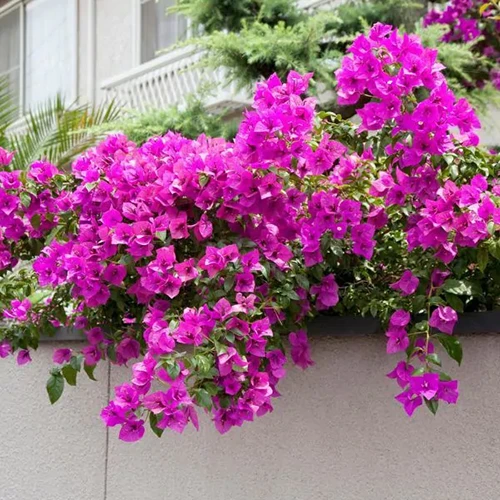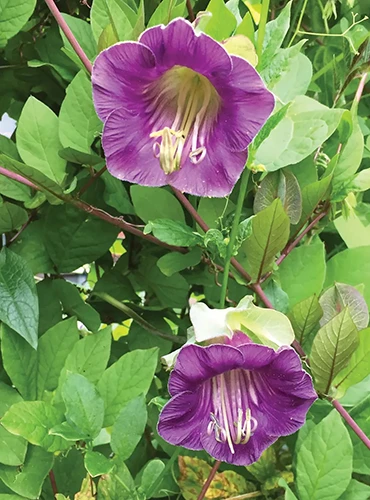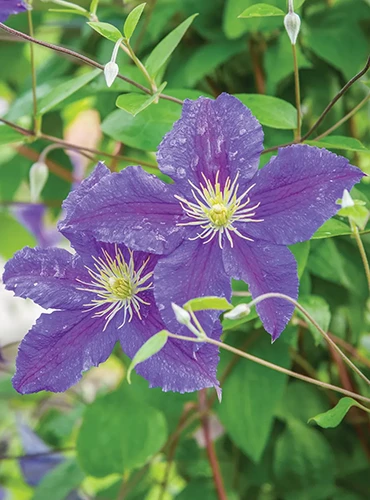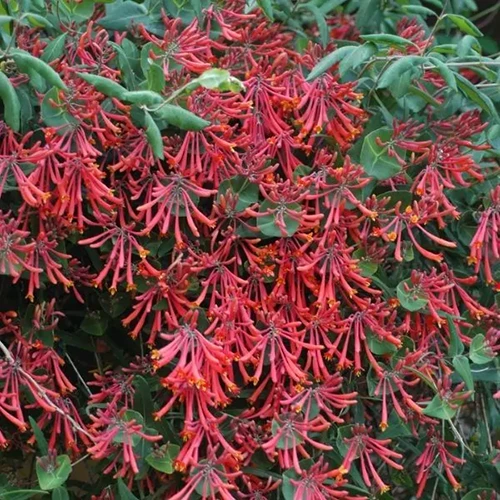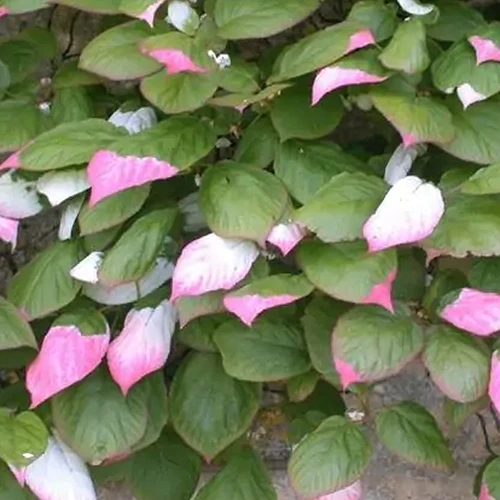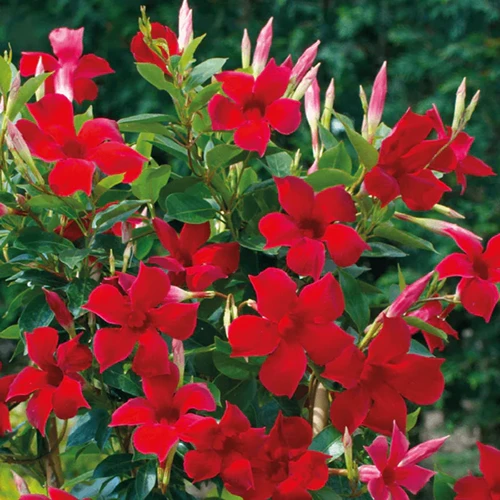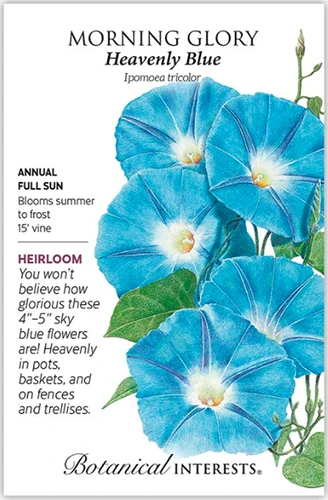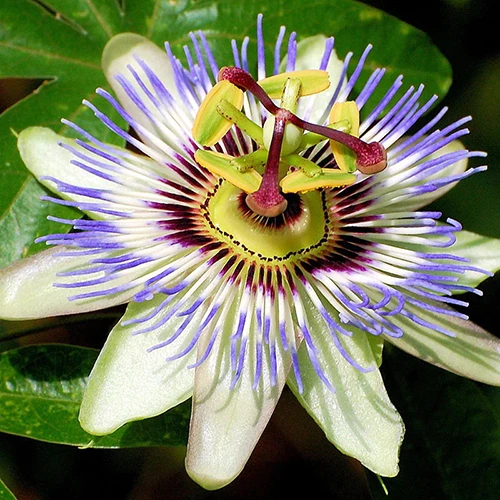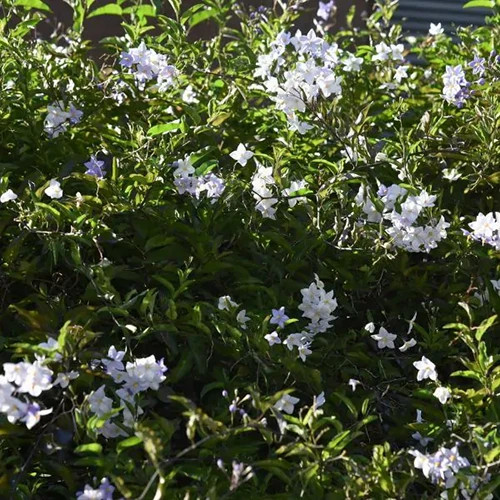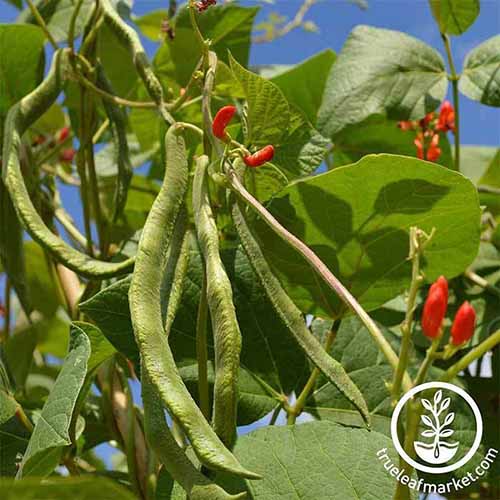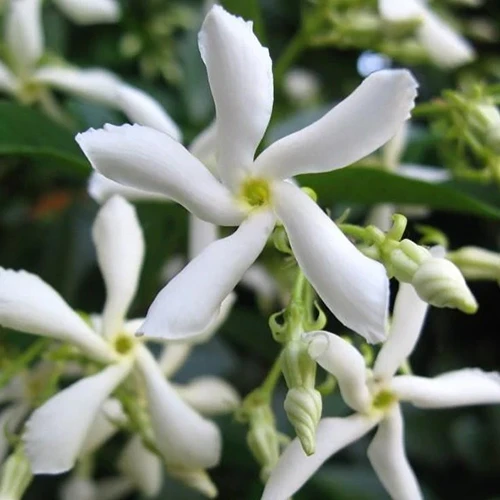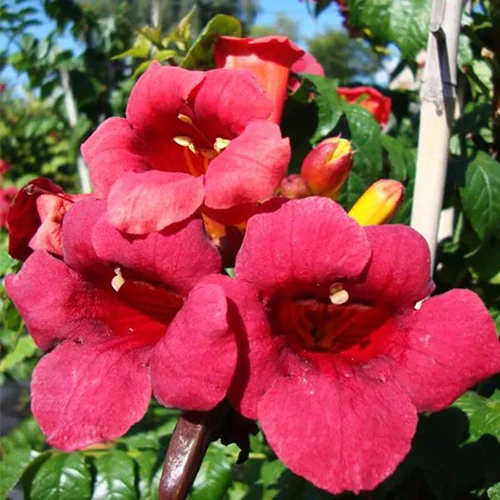With their unique, climbing habit, vines are the perfect plants for adding vertical interest with bright summer colors to the garden.
Most are fast growing, and their clinging or twining tendrils and handsome, lush foliage quickly covers and softens upright structures such as arbors, fences, porches, and patio privacy screens.
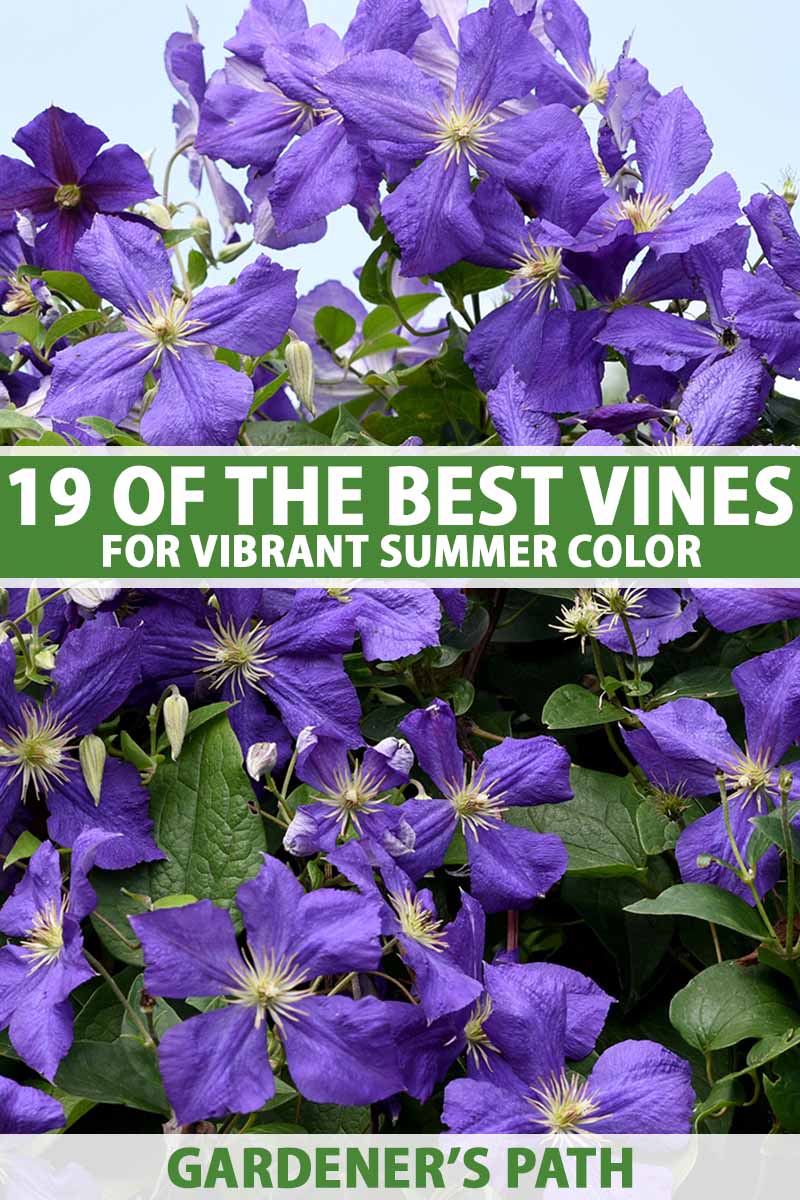
We link to vendors to help you find relevant products. If you buy from one of our links, we may earn a commission.
They also add a beautiful variety of flowers, with bright, bold color, fascinating shapes, and often a sweet fragrance as well – perfect for attracting important and interesting pollinators like bats, bees, butterflies, and hummingbirds.
And many are herbivore resistant as well, unappealing to the likes of deer, rabbits, and squirrels.
Some have good cold hardiness and can withstand freezing temperatures, while many are frost tender.
But they’re as easily cultivated in containers as in the ground.
Potted lianas also climb robustly and can be pruned back to a manageable size to overwinter indoors, so they can be enjoyed in any climate.
Lush, fast-growing, and with perfumed, colorful flowers… Is your patio, pergola, or porch in need of some exciting vining interest this year? Then let’s climb into our roundup of 19 vines for vibrant summer color!
Here’s a quick preview of all of our picks that made the list:
1. Bittersweet
A favorite for crafts and dried flower arrangements, American bittersweet (Celastrus scandens) is a high-climbing perennial that gives a long season of interest.
The flowers are mostly insignificant, but the berries are bright and beautiful.
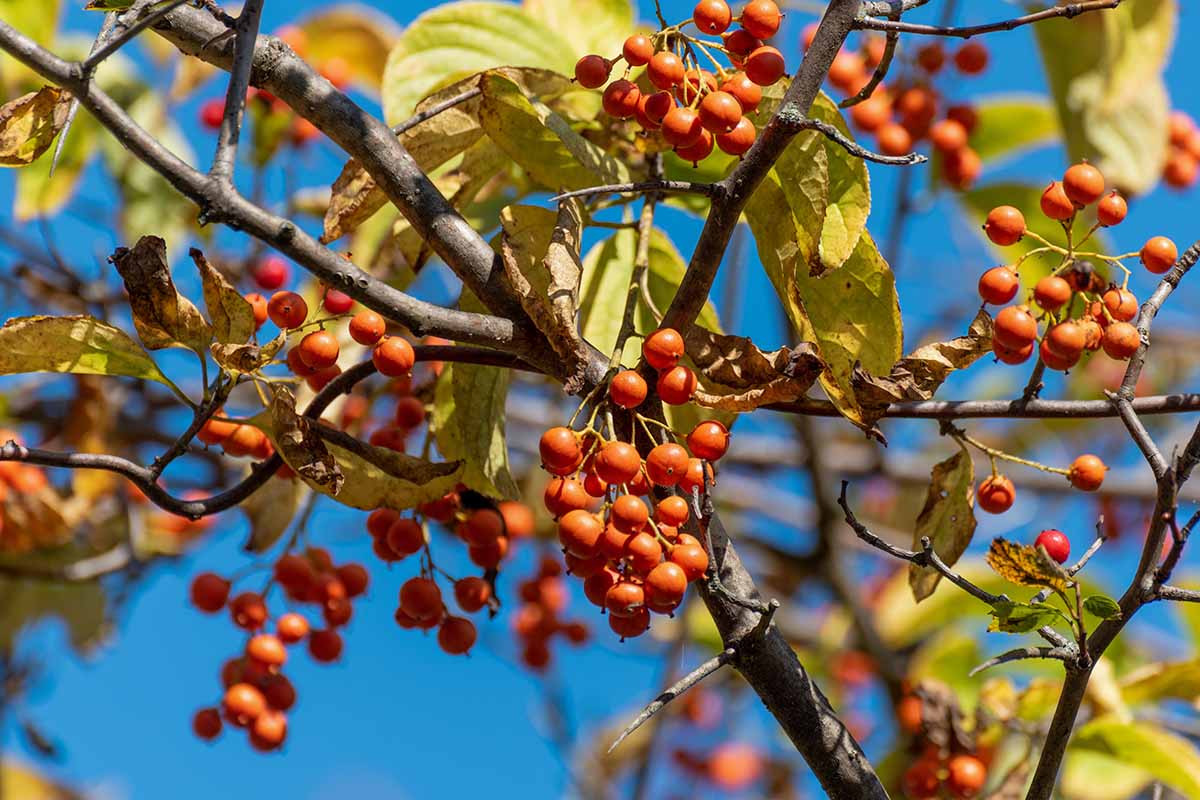
In June, small greenish-white flowers arrive that become drooping clusters of gold to green, pea-sized berries in summer.
By fall, the colorful berries have ripened to bright orange and the fruit capsules split open to reveal scarlet arils. These serve as a winter food for pheasants, ruffed grouse, and songbirds.
These climbers reach a height of up to 30 feet in full sun and the foliage turns bright yellow in fall. But you need both male and female plants to produce fruit.
Native to eastern regions of Central and North America, bittersweet is hardy in USDA Zones 3 to 8.
Also, you’ll want to ensure you’re choosing American bittersweet, C. scandens.
Its close relative Oriental bittersweet, C.orbiculatus, looks similar, but the Asian species is an aggressive, invasive weed in some areas.
2. Bleeding Heart Vine
A bushy, tropical species from west Africa, bleeding heart vine (Clerodendrum thomsoniae) has glossy evergreen leaves and produces fantastic terminal clusters of flowers with bell-shaped, white calyxes adorned with a small red flower poking from the bottom.
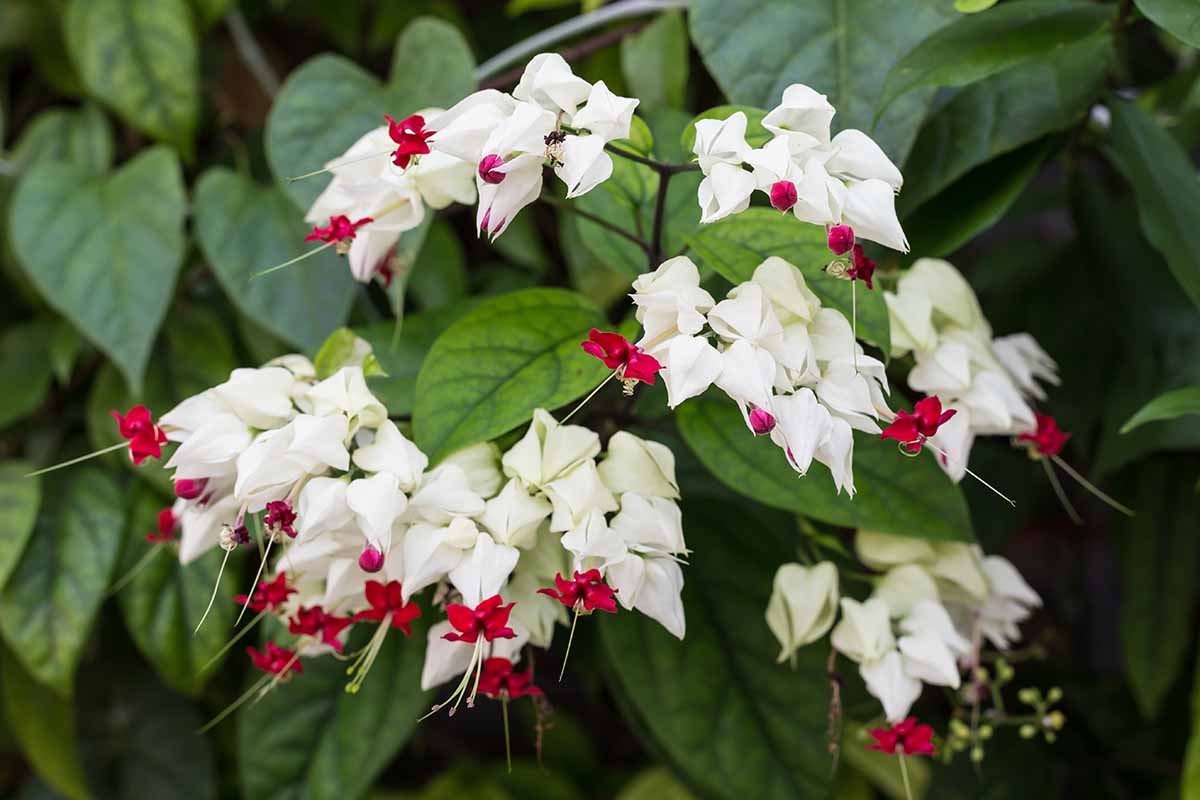
The lightly fragrant flowers bloom throughout summer, attracting bees and butterflies, and the calyxes change from white to pink to mauve as the flowers age.
This is an ideal choice for partial or dappled shade in consistently moist and well-draining soil.
Twining and non-invasive, the stems grow up to 15 feet but are hardy only in Zones 9 and above.
In colder regions, grow bleeding heart vine as an annual or in containers that can be moved indoors for winter protection.
3. Bougainvillea
A flamboyant ornamental from eastern South America, twining bougainvillea (Bougainvillea spp.) makes a bold statement grappling over banks or architectural features in Mediterranean gardens, patios, and poolside oases.
They thrive in baking sun, full-on heat, and lean soil, and can scramble close to 40 feet.
The foliage practically disappears as the colorful bracts flower all summer long, covering the long, thorny canes in shades of cherry, fuchsia, pink, mauve, orange, salmon, white, or yellow.
Bees, butterflies, and moths are attracted to the small flowers within the bracts. Hardy in Zones 9 and above, plant frost-tender bougainvillea in containers in cooler regions and move it indoors for winter.
‘Elizabeth Angus,’ with gorgeous, neon mauve flowers, is available in containers at Nature Hills Nursery.
Our guide on how to grow and care for bougainvillea has all the cultivation details you’ll need.
4. Cathedral Bells
A fast-growing, tender perennial that makes a gorgeous, flowering screen, cathedral bells, or cup and saucer vine (Cobaea scandens), features sweetly fragrant, bell-shaped flowers with an ornate sepal ruff from midsummer to fall.
Climbing and clinging with tendrils and hooks, these Mexican natives spread up to 20 feet and produce purple or white flowers in a full sun location with moist, well-draining soil.
The large, tubular flowers are pollinated by nectar bats, bees, and butterflies. Hardy in Zones 9 to 11, plants in colder regions can be grown as annuals or in a container moved inside for winter.
Cathedral bells seeds are available from Burpee.
5. Clematis
Summer-flowering clematis (Clematis spp.) are those plants that flower in Group C (or 3).
They typically flower in June and July with a repeat bloom in September, or they flower continuously from June until frost, depending on the cultivar.
Flower colors, shape, and size can vary greatly in this group ranging from the highly popular, royal purple ‘Jackmanii’ to the masses of sunshine yellow blooms of ‘Golden Tiara.’
Most varieties grow in the range of six to 15 feet, although ‘Sweet Autumn’ can reach as far as 30 feet.
Bees and butterflies visit the flowers, and the soft down from spent seedheads provides cozy nesting materials for winter-mating birds like the Anna’s hummingbird.
To get a better feel for Group C options, check out our guide to 19 of the best summer-flowering clematis varieties.
‘Jackmanii’ is a classic and much-loved summer clematis. Container plants are available at Burpee.
And have a read of our guide to growing clematis for full cultivation details.
6. False Hydrangea
With delicate flowers similar to lacecap hydrangeas, false hydrangea vine (Schizophragma hydrangeoides) is a deciduous, woody-stemmed climber with beautiful, large clusters of white or pink flowers (actually bracts) that bloom in June and July.
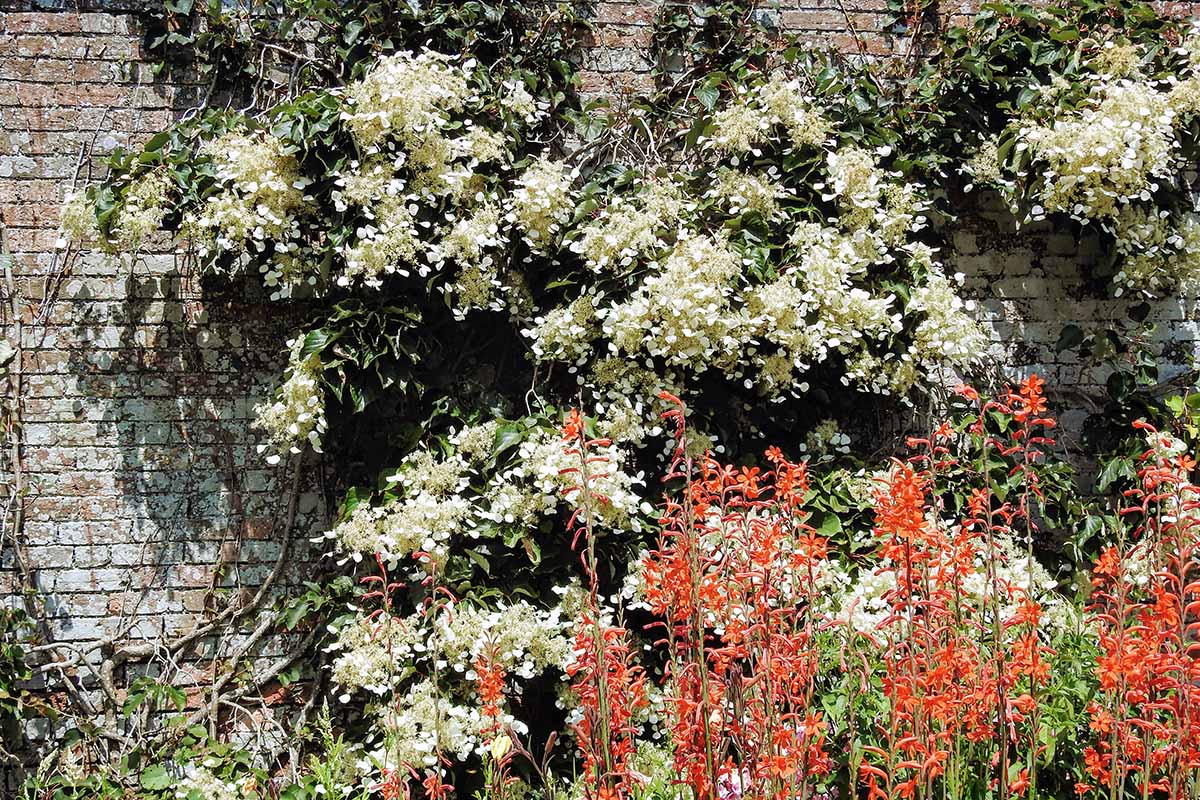
Native to Japan and Korea, the long lianas climb to a height of 40 feet using stem rootlets to attach to surfaces.
False hydrangea vine makes an excellent choice for partial to full shade locations in moist, well-draining soil.
The airy flowers attract bees and butterflies and the handsome, heart-shaped leaves give a good show of yellow foliage in autumn. Hardy in Zones 5 to 9.
‘Flirty Girl’ container plants are available at Home Depot.
7. Honeysuckle
A favorite source of nectar for hummingbirds, twining honeysuckle (Lonicera spp.) stems are covered in sweetly scented, tubular or trumpet-shaped flowers.
Flowering from mid-spring to midsummer in shades of coral, cream, orange, peach, pink, salmon, scarlet, and yellow, the self-clinging stems reach a height of 10 to 30 feet and are hardy in Zones 5 to 9.
A fragrant and pretty choice for climbing and scrambling, some of the introduced species have escaped cultivation and become invasive in some areas.
However, some native North American species offer handsome, non-invasive options for home growth.
Like ‘Major Wheeler’ (L. sempervivens), which is noted for its fabulous clusters of firecracker-red flowers and has the longest bloom time of all species, flowering from late spring to late summer.
Container plants of ‘Major Wheeler’ can be found at Nature Hills Nursery.
Our guide on how to grow climbing honeysuckle has all the cultivation details you need for healthy plants.
8. Jasmine
Vigorous deciduous or evergreen vines that twine to climb, jasmine (Jasminum spp.) produces spectacular clouds of fragrant white or pink flowers on arbors, arches, fences, patio screens, and trellises.

A couple of popular summer-blooming varieties that grow up to 20 feet include the white or pink-flowered common or poet’s jasmine, J. officinale, which is hardy in Zones 8 to 11 or the pink-flowered Stephan jasmine (J. x stephanense), hardy in Zones 7 to 10.
In colder regions, grow plants in containers and bring them indoors for winter.
This guide has the lowdown on how to grow jasmine.
9. Kiwi
For high-reaching splashes of cream and pink, the variegated kiwi (Actinidia kolomikta) is a vigorous, twining climber grown primarily for its flamboyant foliage.
Native to Asia, clusters of fragrant, white, apple-like blossoms flower in early summer but are mostly hidden by the dense canopy of heart-shaped leaves of deep green, cream, and rosy pink.
The flowers attract pollinators like birds and butterflies but both male and female plants are needed to produce fruit.
‘Arctic Beauty’ Variegated Kiwi
Variegated kiwi grows up to 20 feet in a sunny to lightly shaded location.
It needs fertile, well-draining soil and sturdy supports to climb on, such as an arbor, fence, or trellis. Hardy in Zones 4 to 8.
Container plants of the variegated ‘Arctic Beauty’ are available at Nature Hills Nursery. This is a male cultivar, known for having better leaf variegation.
10. Mandevilla
Ideal for adding steamy splashes of fragrance and color to arbors, patio screens, and trellises, mandevilla (Mandevilla spp.) is a fast-growing, twining plant loaded with trumpet-shaped flowers in bright shades of orange, salmon, pink, red, white, and yellow.
Awash in showy flowers all summer, the pretty blooms are visited by bees, butterflies, and hummingbirds.
The stems grow up to 20 feet and love heat and humidity, hailing from tropical and subtropical regions of the Americas.
Hardy in Zones 9 to 11, these frost-tender plants can be grown as annuals or planted up in containers and moved indoors for winter.
Container plants of pink, red, or white mandevilla are available at Planting Tree.
11. Morning Glory
Native to the tropics of the Americas, morning glory (Ipomoea tricolor) is a fast growing, twining plant with large flowers in vibrant shades of blue, magenta, pink, purple, and white.
The trumpet-shaped flowers attract bees, hummingbirds, and moths and look striking when whorling around an obelisk or pergola.
Stems can grow up 15 feet in a sunny location and plants give a long flowering season from early summer to the first hard frost.
Hardy only in Zones 10 and 11, these frost-tender perennials are most often grown as annuals.
I. tricolor is a pretty and less-invasive option compared to common or tall morning glory, I. purpurea.
‘Heavenly Blue’ is a popular cultivar of divine sky blue. Seeds are available at Botanical Interests.
See our guide to growing morning glories for tips.
12. Passionflower
Native to the southeastern US, passionflower (Passiflora spp.) is an easy-care and fast-growing perennial with delightful filament flowers of magenta and purple.
The fragrant flowers bloom from midsummer to early fall on plants that grow up to eight feet in a full sun location, using axillary tendrils for climbing.
The unique flowers are pollinated by bats, bees, butterflies, and hummingbirds.
A beautiful choice for arbors, fences, trellises, and walls, these vines may also be grown in containers. Plants are hardy in Zones 6 to 11.
Seed packets of blue passionflower (P. caerulea) are available at Eden Brothers.
Our guide on how to grow and care for passionflower has all the cultivation details.
13. Potato Vine
The potato vine (Solanum laxum, syn. S. jasminoides) is a showy evergreen perennial that produces abundant clusters of pretty, star-shaped flowers in pale lavender, baby blue, or white, flowering from summer to autumn, or year-round in mild climates.
Shrubby plants with highly fragrant flowers that attract bees, butterflies, and hummingbirds, these South American natives climb with twirling tendrils and look fantastic clambering on arbors, fences, pergolas, and porches.
Plants can reach a height of up to 30 feet in a sunny location with fertile, well-draining soil. Prune in spring to manage growth and size.
Hardy in Zones 9 to 11, S. laxum grows well in containers and can be brought indoors for winter protection in colder Zones.
Container plants are available at Nature Hills Nursery.
14. Purple Bell Vine
A tender perennial most often grown as an annual, purple bell vine (Rhodochiton atrosanguineus) has a long blooming season from early summer into fall, producing clusters of pendant, bell-like flowers.
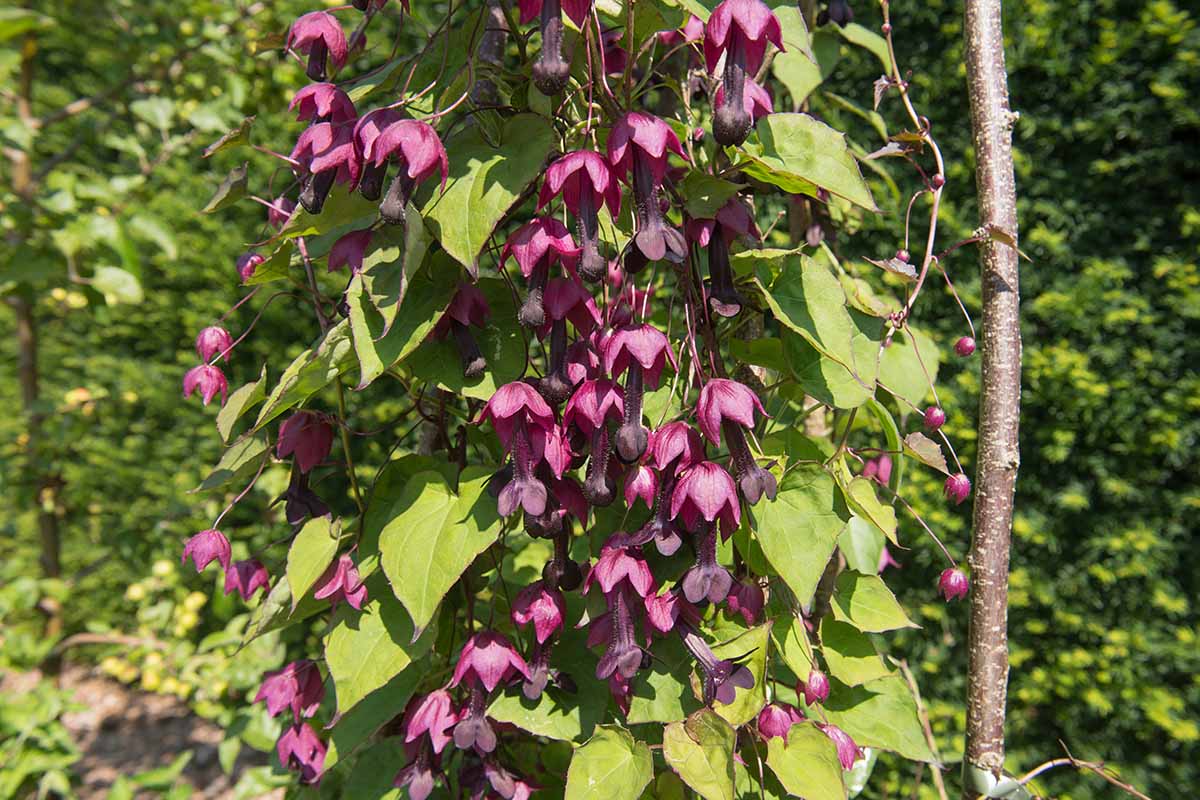
Loved by bees and hummingbirds, the flowers have a tubular corolla of dark eggplant purple that hangs like a clapper and is surrounded by the bell-like calyx of rosy pink sepals.
This twining Mexican native does best in full to part sun and climbs up to 10 feet on arbors, pergolas, and trellises. Hardy in Zones 8 to 10.
15. Silver Fleeceflower
A vigorous scrambler, silver fleeceflower (Fallopia aubertii, syn. Polygonum aubertii) is an Asian native and features fragrant clouds of soft, lacy flowers in drooping panicles from July to September.
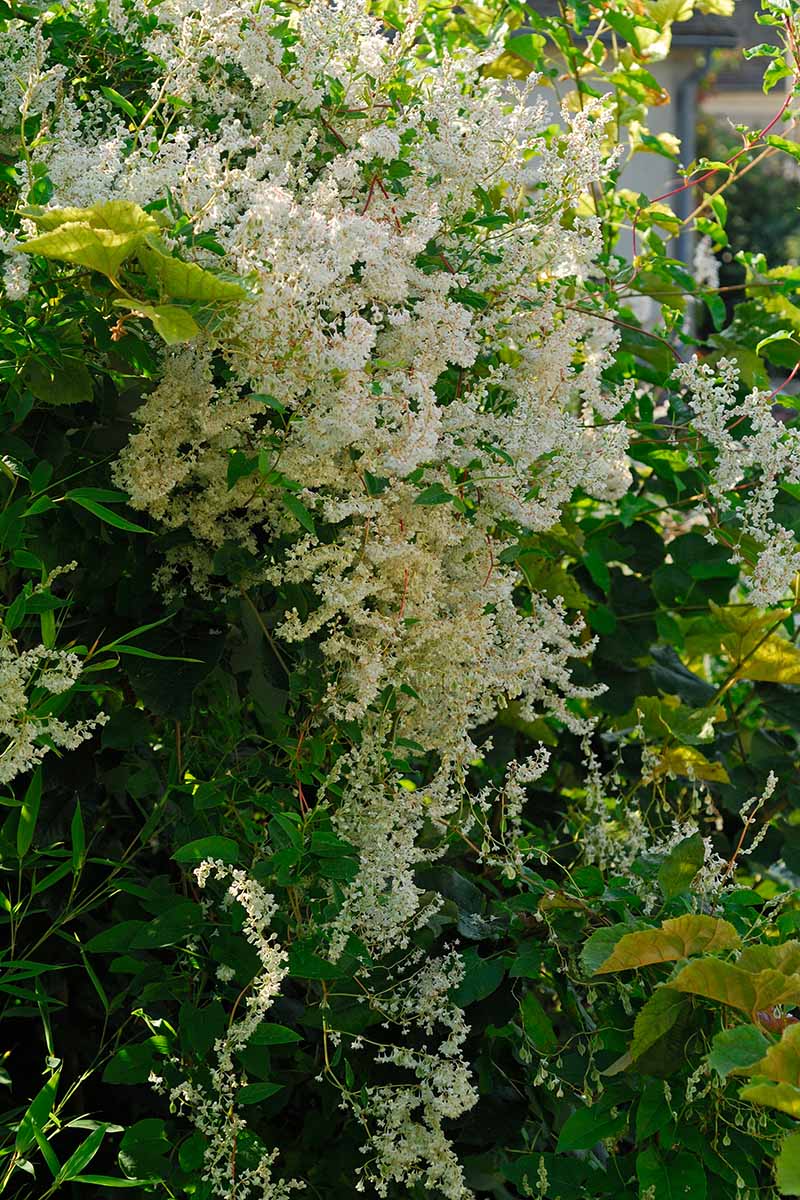
A deciduous to semi-evergreen plant with exceptionally fast growth – up to 12 feet in a single year – it makes a lovely screen.
And the twisting stems are fantastic for clambering up and through arbors, chain-link fences, pergolas, porches, and trellises.
The small, downy flowers attract bees and butterflies, and plants grow up to 30 feet in moist soil with bright but indirect light. Hardy in Zones 4 to 8.
However, it should be noted this plant can quickly become invasive and is considered a weed of concern in some areas.
Keep plants contained to freestanding beds and cut back hard in spring to resize and manage growth.
16. Scarlet Runner Bean
Visually stunning as well as delicious and nutritious, scarlet runner beans (Phaseolus coccineus) are noted for their prolific growth – up to 20 feet in one season – and the bright, beautiful scarlet flowers that are followed by a crop of tasty beans.
A frost-tender and short-lived perennial, scarlet runner beans are native to Central America and Mexico and are most often grown as an annual ornamental or vegetable.
With their lush foliage and pretty flowers, they make an ideal choice for a living screen or running up a trellis in a sunny spot with fertile soil.
Flowering starts about two months after sowing and can be prolonged by regularly picking the green beans, which can be eaten fresh or as a shelled bean.
Seeds in packets, ounces, and one-pound sizes are available at True Leaf Market.
Learn more about how to grow pole beans in our guide.
17. Star Jasmine
A beautiful evergreen, star jasmine (Trachelospermum jasminoides) produces masses of fragrant flowers in late spring to early summer, attracting bees, butterflies, and hummingbirds.
The small star-shaped flowers of white or pink cover twining stems that grow up to 20 feet in full sun to partial shade.
They make an excellent climber on arbors, fences, privacy screens, trellises, and walls, and a beautiful ground cover as well.
Hardy in Zones 8 to 10, star jasmine can be grown in a container and overwintered indoors in cooler climates.
Container plants are available at Planting Tree.
18. Trumpet Vine
A vigorous grower, trumpet vine (Campsis spp.) produces a steady parade of beautiful and long-lasting, trumpet-shaped flowers in orange, red, or yellow that hummingbirds flock to in droves.
This native of the eastern US blooms from summer into fall in a full sun to partial shade location and can grow as much as 40 feet with a sturdy support.
C. grandiflora is a little less aggressive in its spread than C. radicans, and all species can be kept in check with a hard pruning in spring to manage size and spread. Hardy in Zones 4 to 9.
Container plants of ‘Atomic Red’ can be found at Nature Hills Nursery.
19. Yellow Butterfly Vine
Flowering from late spring to midsummer, the yellow butterfly vine (Mascagnia macroptera) is a fast-growing, evergreen perennial native to Central and South America.
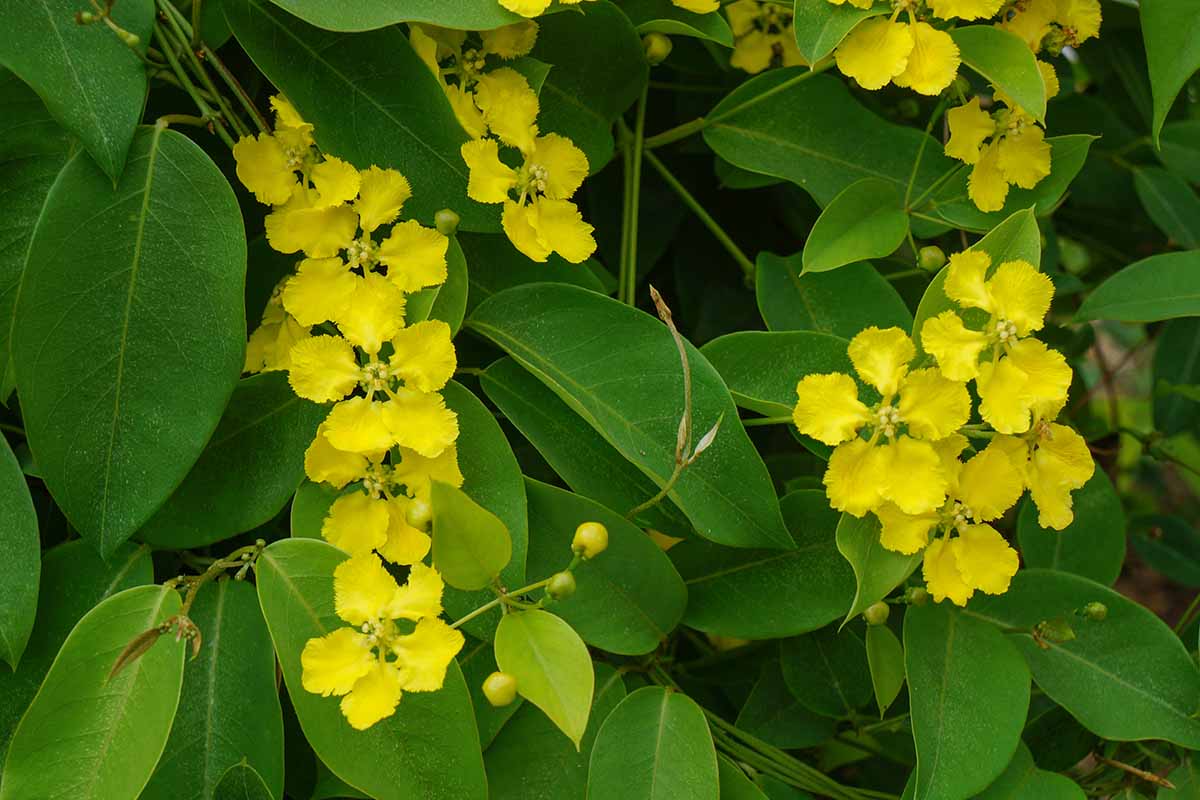
Attractive to bees and butterflies, clusters of lemon yellow flowers pop against the dark green foliage. These are followed by winged, chartreuse seed pods that resemble small butterflies.
Growing up to 12 feet with a twisting and twining habit, yellow butterfly vine is impervious to heat and makes an excellent option for full sun locations like west-facing fences, porches, or walls, but also grows in partial shade. Hardy in Zones 8 to 11.
Vibrant Summer Color
Fast-growing and easily cultivated, climbing vines are perfect for adding lush foliage and colorful flowers to upright structures or to create a living privacy screen.
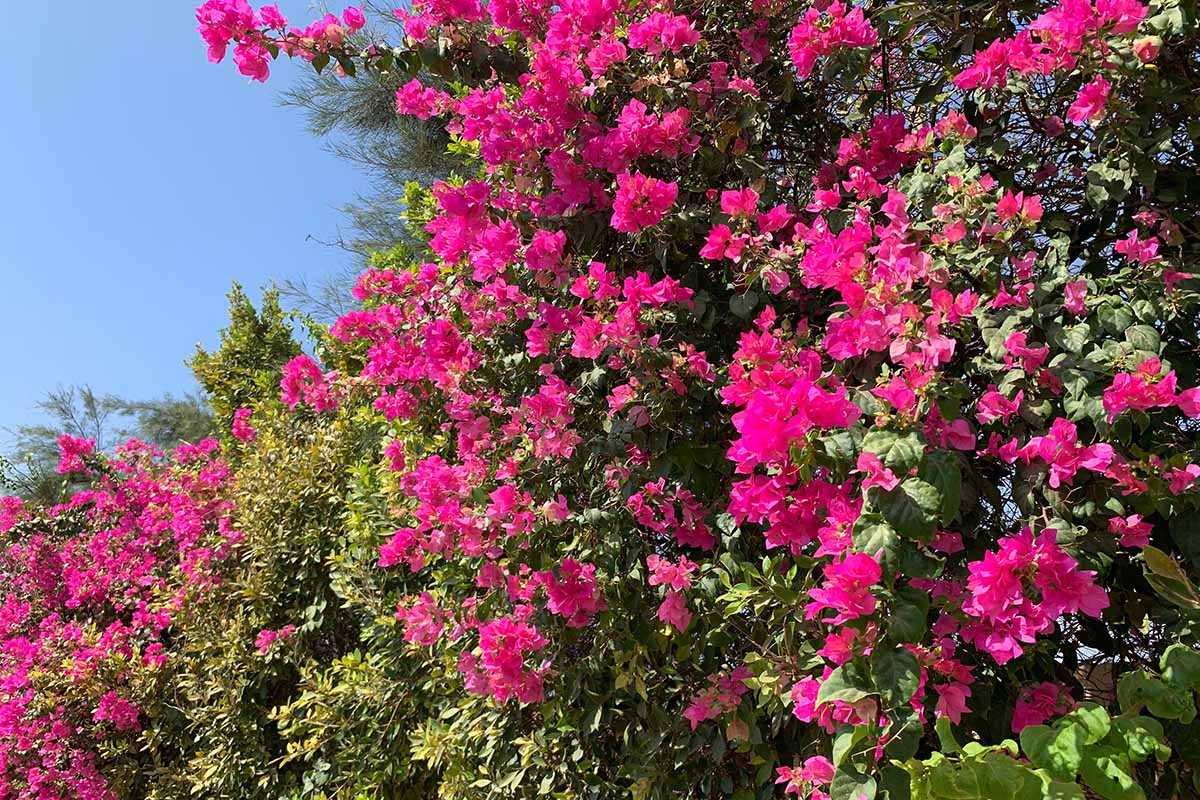
Cold-hardy varieties suitable for your region can be planted in the ground. And try frost-tender ones in containers – then prune them back and move pots indoors for winter protection.
However you grow them, you’re sure to be impressed with their fantastic spread and vibrant summer colors!
And if you’re thinking of adding any vines to the garden for brilliant fall colors, be sure to read these guides next:
